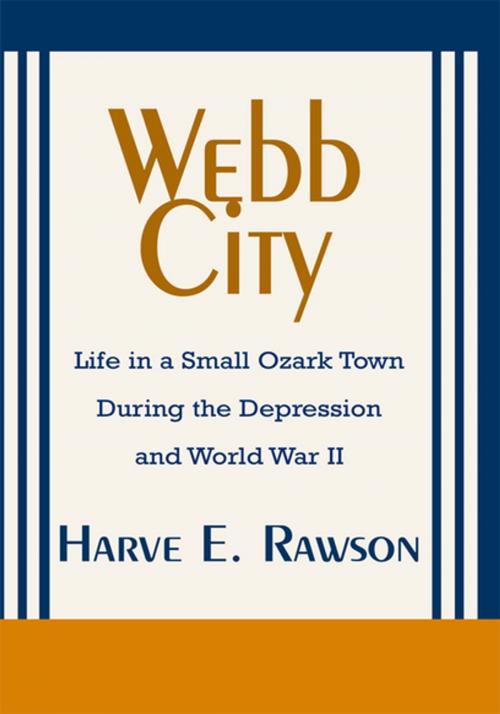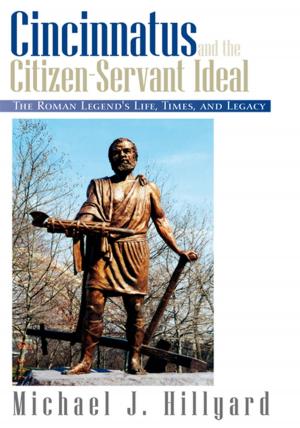Webb City
Life in a Small Ozark Town During the Depression and World War Ii
Nonfiction, History, Modern, 20th Century| Author: | Harve E. Rawson | ISBN: | 9781462800308 |
| Publisher: | Xlibris US | Publication: | April 4, 2001 |
| Imprint: | Xlibris US | Language: | English |
| Author: | Harve E. Rawson |
| ISBN: | 9781462800308 |
| Publisher: | Xlibris US |
| Publication: | April 4, 2001 |
| Imprint: | Xlibris US |
| Language: | English |
A psychologist authored this nostalgic look at a small Ozark town, Webb City, Missouri, from the depths of the Great Depression to the end of the Post World War II Era. It is a beautiful tribute and affirmation of so-called middle America and small town values and attempts to demonstrate how small interactions in a childs life make a tremendous difference. The story is unique: the tales are told as seen through the eyes of a perky, bright, rather independent red-haired boy who finds out for himself the good and bad of people, examines the values people use to give meaning to their lives, explores the deep prejudices and hero-worship that hinder their growth, and, most importantly, discovers that most people are on your side when the going gets rough.
The ugliness of the Great Depression - the chronic unemployment, the hunger, the feelings of worthlessness, the poor health, the absolute despair - is the setting for the first part of the story as Ozarkians struggle to survive and retain human dignity in the process. Neighbors help each other simply because they know they may be the next to need help; employment is shared because it is dignifying; self-reliance is given the highest priority; but schooling and learning is never neglected. On the contrary - it is given new importance as the way out of this mess.
World War II eventually effects even this remote little town in the Ozarks. The unemployment crises ends, but the town sacrifices its best to the Armed Services; its minerals are exploited callously without environmental regard; and new prejudices emerge, with are damaging to all.
The end of the War brings much greater material prosperity, but the old social order is rapidly collapsing. Rigid racial segregation becomes untenable, families are moving to new opportunities, and technology threatens many social institutions which once seemed to serve so well.
Within this background, the author relates those childhood experiences that shaped him as an adult. Each family member, each neighbor, each job, each institution, each friend - all molded his character and all taught him valuable lessons for dealing with both personal and professional life.
This is a collection of parables, It is not an autobiography. It is not a book of nostalgia. It is not a history of the Depression or World War II. It is not a history of Webb City. It is a series of tales - teaching tales - that show how sometimes seemingly small incidents in a childs life can change them forever. It also clearly demonstrates that we are always affecting others by what we do - especially children!
The parables cover altruism, avarice, selflessness, sharing, sacrifice, giving, self-centeredness, devotion, loyalty, concern, patriotism, love of learning, poverty, poor health, unemployment, racial and religious prejudice, insensitivity, callousness, religious beliefs, greed, and quite a few other human foibles and strengths.
This book, part of the Tales of the Ozarks series, contains material from some events of Webb City over 50 years ago, including references to actual places, people, and events, it must be read as a work of reimagined memory, which is, as we all know, a form of fiction. Certain historical facts, sequencing of events, peoples motives and intents, and even dialogue may not be accurate.
A companion CD of these tales and others, entitled Tales of the Ozarks will soon be available.
A psychologist authored this nostalgic look at a small Ozark town, Webb City, Missouri, from the depths of the Great Depression to the end of the Post World War II Era. It is a beautiful tribute and affirmation of so-called middle America and small town values and attempts to demonstrate how small interactions in a childs life make a tremendous difference. The story is unique: the tales are told as seen through the eyes of a perky, bright, rather independent red-haired boy who finds out for himself the good and bad of people, examines the values people use to give meaning to their lives, explores the deep prejudices and hero-worship that hinder their growth, and, most importantly, discovers that most people are on your side when the going gets rough.
The ugliness of the Great Depression - the chronic unemployment, the hunger, the feelings of worthlessness, the poor health, the absolute despair - is the setting for the first part of the story as Ozarkians struggle to survive and retain human dignity in the process. Neighbors help each other simply because they know they may be the next to need help; employment is shared because it is dignifying; self-reliance is given the highest priority; but schooling and learning is never neglected. On the contrary - it is given new importance as the way out of this mess.
World War II eventually effects even this remote little town in the Ozarks. The unemployment crises ends, but the town sacrifices its best to the Armed Services; its minerals are exploited callously without environmental regard; and new prejudices emerge, with are damaging to all.
The end of the War brings much greater material prosperity, but the old social order is rapidly collapsing. Rigid racial segregation becomes untenable, families are moving to new opportunities, and technology threatens many social institutions which once seemed to serve so well.
Within this background, the author relates those childhood experiences that shaped him as an adult. Each family member, each neighbor, each job, each institution, each friend - all molded his character and all taught him valuable lessons for dealing with both personal and professional life.
This is a collection of parables, It is not an autobiography. It is not a book of nostalgia. It is not a history of the Depression or World War II. It is not a history of Webb City. It is a series of tales - teaching tales - that show how sometimes seemingly small incidents in a childs life can change them forever. It also clearly demonstrates that we are always affecting others by what we do - especially children!
The parables cover altruism, avarice, selflessness, sharing, sacrifice, giving, self-centeredness, devotion, loyalty, concern, patriotism, love of learning, poverty, poor health, unemployment, racial and religious prejudice, insensitivity, callousness, religious beliefs, greed, and quite a few other human foibles and strengths.
This book, part of the Tales of the Ozarks series, contains material from some events of Webb City over 50 years ago, including references to actual places, people, and events, it must be read as a work of reimagined memory, which is, as we all know, a form of fiction. Certain historical facts, sequencing of events, peoples motives and intents, and even dialogue may not be accurate.
A companion CD of these tales and others, entitled Tales of the Ozarks will soon be available.















